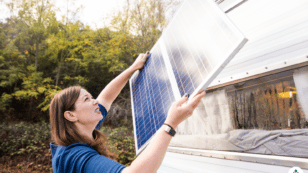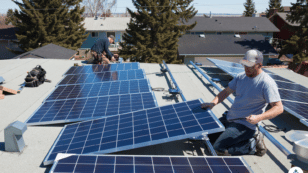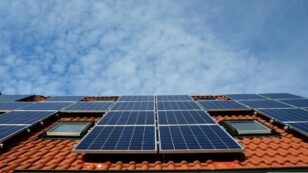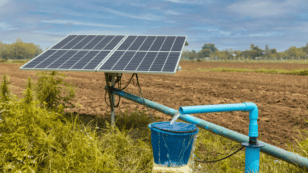
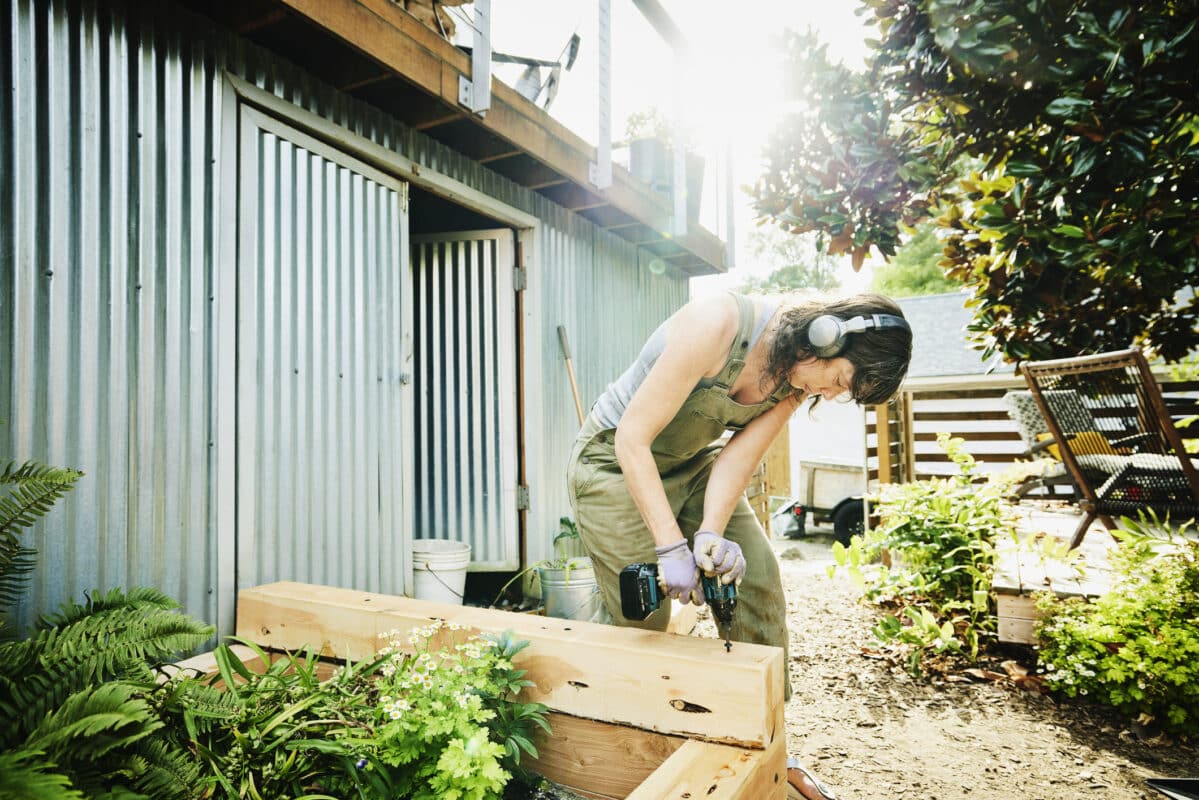
8 Sustainable Home Improvements You Can Make In 2024
Each product and or company featured here has been independently selected by the writer. You can learn more about our review methodology here. If you make a purchase using the links included, we may earn commission.
From starting a compost bin to installing solar panels, there are plenty of ways both big and small to make your home more sustainable this year. Sustainable home improvements can not only reduce your impact, but they can also improve your health and well-being while racking up energy savings. Plus, according to Zillow’s top home trends for 2022, sustainability is a top priority for young homeowners.
Whether you’re planning to move or just want to make your pad more eco-friendly, consider these eight sustainable home improvements.
1. Install Energy-Efficient Lighting
Upgrading your home’s lighting is one of the easiest sustainable home improvements you can make, and it offsets a great deal of energy use. LED lights use up to 90% less energy than regular bulbs (and save the average customer about $225 per year); other subtle changes to your home’s lighting can make a big difference in your energy bill as well.
During the summer months when you need to keep your home cool, pulling curtains over your windows can ease the burden on your air conditioner. If you’re shopping for curtains, keep in mind that light colors will reflect the most sunlight from entering your home. Though you’ll likely need to use your home’s lights more often with curtains, keeping your home cool will save more energy than keeping it lit (especially if you’re using energy-efficient light bulbs).
If you’re in the process of designing your own home, consider your climate when deciding where to place windows, how big they should be and if you’ll want them covered. Those in cooler climates can use the sun to heat their home through south-facing windows during the winter. Skylights, glass doors and windows can also naturally light a home to cut down on costs — just remember to cover them when the weather heats up.
2. Use Recycled, Repurposed or Reclaimed Materials
We’ve all heard the phrase reduce, reuse, recycle, and there should be no exception when improving a home. New construction and renovations typically create unnecessary waste — and lots of it. In most cases, there’s a disconnect between where materials for your home come from and where they go when you no longer need them. Many homeowners don’t know that outfitting (or in some cases even building) a home with repurposed or reclaimed materials can offset a tremendous amount of waste while saving money in the process.
If you’re looking to renovate part of your home, whether with new flooring, cabinets, doors or otherwise, consider using repurposed materials. Repurposed or reclaimed materials (wood, beams, doors, flooring, copper, etc.) are still structurally sound and available in both quantities and prices that might surprise you. Accessibility to repurposed materials remains the largest obstacle keeping this practice from reaching the mainstream.
That being said, a growing number of resources are available to find reclaimed materials near you. Here are some of our favorite options:
-
- Craigslist
-
- Facebook Marketplace

Blue Raven Solar

Regional Service
Average cost
Pros
- Industry-leading in-house financing
- Competitive pricing
- Excellent reputation
Cons
- Doesn't offer solar batteries (coming 2022)
3. Upgrade or Seal Windows and Doors
The U.S. Department of Energy estimates that 30% of home energy is lost through windows, and a lot of hot air slips out through drafty doors as well in the cool seasons. If your home suffers from high electricity bills during hot or cold months, energy-efficient windows may be a solution for you. These windows are designed to prevent your heated or cooled air from leaving your home.
Not up for the hassle of replacing your old windows or doors? You can upgrade your home’s efficiency anyway by resealing them with weather stripping, caulk, glaze, door snakes or window treatments.
If you think you might have a drafty door or window, here’s a simple test to find out: Light a candle and hold it next to the window or door seam that you think might be drafty. If the flame bends, it means that your window or door is letting air into or out of your home.
4. Switch to Solar Energy
Installing solar panels on your roof is just one way to take advantage of solar energy — many home solar appliances have become affordable and easy to install in recent years. Here are a few of our favorite solar-related sustainable home improvements for 2022:
-
- Solar panels: The cost of solar panels has dropped in price by more than 70% over the last decade, according to the Solar Energy Industries Association (SEIA). Solar panels still carry a significant price tag, however, and may not work well for every home.
-
- Solar attic fans: In warm climates like those of the Sun Belt in the U.S., heat trapped in attics can make its way into other areas of homes, plus damage insulation, roofs and the structural integrity of a house. Solar-powered attic fans provide an affordable, set-it-and-forget-it solution to keeping your attic cool and well-ventilated without drawing any energy from your home.
-
- Solar water heaters: Heating water accounts for around 20% of residential energy use, according to the DOE. Solar water heaters can provide a cost-effective and sustainable method for reducing home energy use by heating, storing and insulating your hot water for use at any time.
-
- Outdoor solar lights: Installing solar lights allows you to do away with extension cords and surge protectors. From solar string lights to solar flood lights to pathway lights, you’ll likely be able to find a sun-powered alternative to any external lighting need. Some of these lights can even be used inside if your interior collects enough natural light from the outdoors. Modern outdoor solar lights come complete with rechargeable lithium batteries making sure they stay powered through the night.
5. Add Color With Eco-Friendly Paint
According to the Environmental Protection Agency, volatile organic compounds (VOCs) are human-made chemicals that are used and produced in the manufacturing of things like paints, pharmaceuticals and refrigerants. These compounds are emitted into the air as gasses and contain harmful chemicals and carcinogens that can cause both short-term and long-term health issues to humans and the environment.
These days, VOCs are found mostly in older or cheaper products. So if you’re planning on a home improvement project involving paint, make sure to choose a product that doesn’t contain these compounds.
6. Start a Compost Bin
Did you know that food scraps and yard waste make up over 30% of what we throw away? Considering that the U.S. produces nearly 300 million tons of waste per year (about 5 pounds per person per day), finding a way to reduce, reuse or recycle this waste can have huge environmental impacts.
Starting a compost bin allows you to turn that waste into organic material that can be added to soil to help plants grow. Healthy soil is important to fighting climate change, and composts allow you to contribute to the fight one banana peel or used coffee ground at a time.
Not sure where to start? Here’s a quick guide.
7. Plant a Garden
We could dedicate an entire article to the benefits of starting a garden at home, whether it’s a full outdoor plot or just an indoor herb garden. For brevity’s sake, here are a few of the most notable benefits gardening offers the environment and your personal health and well-being:
-
- Plants are highly effective natural air purifiers that absorb carbon dioxide and pollutants. In exchange, they of course provide us with cleaner oxygen and fresher air.
-
- Plants reduce erosion and improve soil health.
-
- Pollinators like bees are the engines that run a healthy ecosystem. Adding even a few areas of pollinator-friendly plants or flowers in your garden can provide valuable habitat for animals that are otherwise experiencing widespread habitat losses.
-
- A well-designed garden can add a great deal of value to your home. Additional curb appeal, better air quality and more biodiversity all contribute to homes selling faster than those without strategic landscaping.
-
- Studies show that even looking at a garden can reduce stress, improve heart health, lower blood pressure and ease muscle tension. Starting your own garden provides those benefits and more.
-
- Lest we forget, growing your own food provides you not only with delicious, healthy ingredients for meals, but also a sense of satisfaction, confidence in the quality and health of your products, and a deeper connection with the natural world.
8. Invest in Energy-Efficient Appliances
This one likely comes as no surprise. If you’ll soon need to replace any of the following appliances, consider choosing energy-efficient models, like those that are Energy Star certified. The reason we recommend investing in these particular appliances is that your energy bill savings should pay off the price difference quickly:
-
- Refrigerator
-
- Washing machine
-
- Dryer
-
- Heating/cooling appliances
-
- Smart thermostat
-
- Television
-
- Water heater
-
- Ceiling fans
Not sure where to start with sustainable home improvements? Most of the best solar energy companies offer energy efficiency audits, or assessments of your home’s efficiency, to pinpoint what improvements will offer the most value to your home’s energy system. To get in touch with a solar company near you, use this tool or fill out the form below.


 233k
233k  41k
41k  Subscribe
Subscribe 





